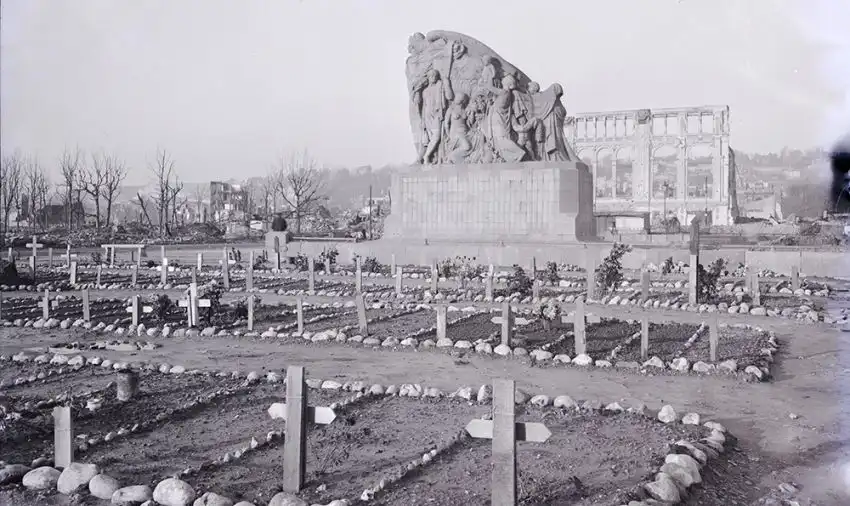
Home>The Research>Seminars>Seminars by focus area and theme>Two greater wars
Two greater wars
Experiences | Social actors, movements & groups

The seminar intends to build bridges between dynamic historiographies that are nevertheless all too often hermetically sealed off from one another: the historiographies of the conflicts of the first 20 th century. It proposes to study the societies involved in all forms of conflict from upstream to downstream of the two world wars, i.e. from the “Greatest War” (John Horne and Robert Gerwarth), taking into account the Balkan Wars (1912-1913) which prefigured the First World War and the long period of coming out of war (1919-1923), to the “guerre monde” (Alya Aglan and Robert Frank) that gradually set the globe ablaze from the Japanese invasions (1937) through to the cultural and military demobilization of societies after 1945, in a time of “violent peace” (Peter Gatrell).
The objective of the aforementioned geographical, chronological and thematic expansion is to examine the continuities and breaks in the traces left by wars on the societies that experienced them. Such a research sequence will enable to reconsider the old idea of a “European Civil War” or of a “Thirty Years’ War”, and to shed more light on the diversity of situations and of relationships to the warlike phenomenon.
The approach is resolutely comparative, since the seminar systematically brings together two researchers specializing in subjects that have similarities but belong to different contexts. Such a cross-cutting thematic approach should prove fertile by intersecting and questioning historiographical perspectives.
The seminar will be organized into four hybrid monthly sessions in Paris and a final workshop in one of the partner laboratories (Dublin, Le Havre, Tours, Strasbourg) held between January and May 2025.
Calendar 2024-2025 : "Circulations"
- session 1 | 01/13/2025, 14:30-17:00
LA CIRCULATION DES INFORMATIONS À L'ÉPREUVE DE LA GUERRE
Nina RÉGIS (Casa Vélázquez, Madrid)
"'Majesté, Maman pleure toujours'. Des lettres à Alphone XIII aux enjeux politiques d'une initiative humanitaire espagnole dans les camps de prisonniers allemands (1914-1924)"
Sébastien FARRÉ (Maison de l'Histoire, Université de Genève)
"Documenter, communiquer, passer sous silence... le CICR en temps de guerre (1936-1945)"
- session 2 | 02/10/2025, 14:30-17:00
DÉPLACEMENTS DE POPULATIONS, ÉVACUATIONS ET SAUVETAGES
Hélène GACIC (Université de Lorraine, CRULH)
"Entre évacuations et migrations, le parcours et l'accueil des réfugiés serbes durant la longue Grande Guerre"
Laura HOBSON FAURE (Université de Paris I, Panthéon-Sorbonne, CHS)
"Circulations intra-européennes et transatlantiques face aux persécutions nazies : le Kindertransport vers la France et les Etats-Unis pendant la Shoah, 1938-1942"
- session 3 | 03/10/2025, 14:30-17:00
LES RÉFUGIÉS : NORMES ET INSTITUTIONNALISATION D'UNE FIGURE EN CONSTRUCTION
Ismee TAMES (NIOD, Université d'Utrecht)
"Nansen Refugees: Stateless in the Age of the World Wars"
Thomas CHOPARD (EHESS)
"Qu'est-ce qu'un bon réfugié juif ? L'Organisation internationale pour les réfugiés et la création d'une jurisprudence internationale"
- session 4 | 04/07/2025, 14:30-17:00
LA CIRCULATION DES MORTS
Marine MEUCCI DULY (Université d'Aix-Marseille)
"Les corps de la Grande Guerre ou comment gérer la mort de masse en urgence"
Jean-Marc DREYFUS (Université de Manchester, chercheur associé au CHSP)
"Des morts qui dérogent. La recherche des corps des déportés de France et la construction de la nécropole nationale du Struthof, 1946-1960"
- Study Day | 05/13/2025, at Strasbourg
RETOURS EN SORTIE DE GUERRE
Program broadcast later